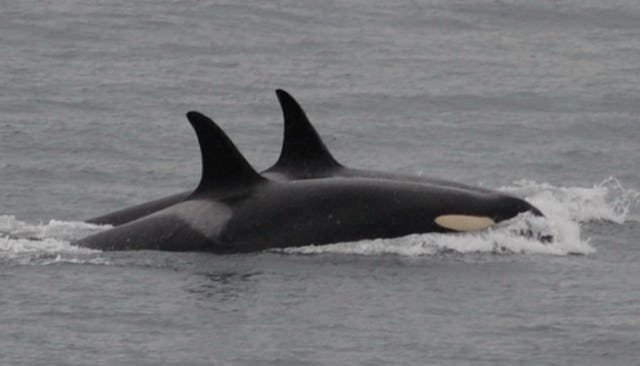Grieving Mother Orca Releases Dead Calf After 17 Heartbreaking Days

Grieving orca mom has finally released her baby after carrying its body for over two weeks
The world has watched for 17 days as a whale named Tahlequah, or J35 as scientists call her, carried her dead baby’s body on what’s being called a “tour of grief.” Now, it seems the tour is over as the momma has released her calf’s remains into the water and moved on with her pod.
The scientists at The Center For Whale Research who have been tracking her pod off the coast of Vancouver reported over the weekend that Tahlequah had finally let go of her baby. “Her tour of grief is now over and her behavior is remarkably frisky,” they wrote.
The scientists spotted her as she “vigorously chased a school of salmon with her pod-mates in mid-Haro Strait in front of the Center for Whale Research for a half mile” after releasing the dead calf she carried for 17 days over the course of 1000 miles. Telephoto images taken from shore show the momma whale in good physical condition following her long odyssey of saying goodbye to her child. It was two days prior to the scientists officially confirming that Tahlequah had let the calf go that whale-watchers thought they saw her without the baby’s body at Georgia Strait near Vancouver.
The Center reports that the baby’s body has likely sunk to the bottom of the Salish Sea and that researchers probably won’t have a chance to perform a necropsy and gather more information on why the calf died.
When Tahlequah was first spotted pushing her dead calf through the water, the Center reported that the population of whales she’s a part of have not done well in recent decades as far as reproducing. “Regrettably, approximately 75% of newborns in the recent two decades following designation of the Southern Resident killer whale population as ‘Endangered’ have not survived, and 100% of the pregnancies in the past three years have failed to produce viable offspring,” they wrote.
Tahlequah was first noticed holding up her calf on the start of her heartbreaking journey in late July. The baby didn’t live long.
“The baby’s carcass was sinking and being repeatedly retrieved by the mother, who was supporting it on her forehead and pushing it in choppy seas,” said the Center for Whale Research in a statement. “The mother continued supporting and pushing the dead baby whale throughout the day until at least sunset.”
It wasn’t just Tahlequah shouldering her grief — other females in her pod reportedly helped her keep her baby afloat at various points and joined in her sadness. “At sunset, a group of 5-6 females gathered at the mouth of the cove in a close, tight-knit circle, staying at the surface in a harmonious circular motion for nearly 2 hours. As the light dimmed, I was able to watch them continue what seemed to be a ritual or ceremony. They stayed directly centered in the moonbeam, even as it moved. The lighting was too dim to see if the baby was still being kept afloat. It was both sad and special to witness this behavior,” a San Juan local said.
All mothers everywhere keenly feel J35’s heartbreak and watching her let her baby go is nothing short of gut-wrenching. Humans are certainly not the only parents in the animal world to form a loving bond with their little ones and witnessing another creature experience that kind of emotion is a bittersweet reminder of that fact.
This article was originally published on